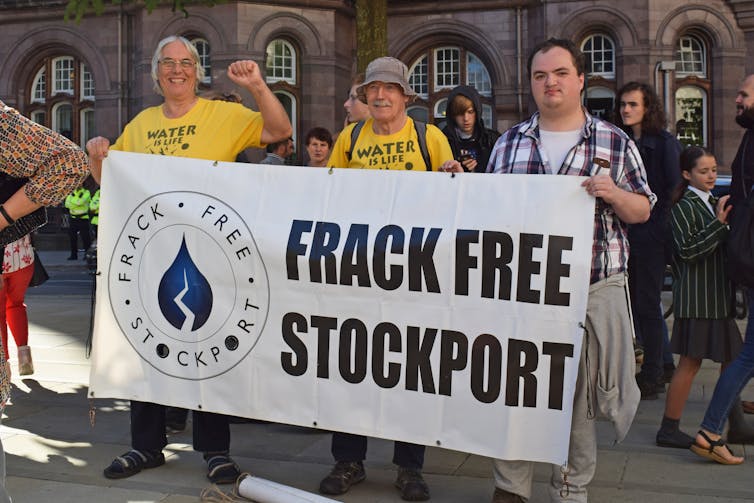The UK government has lifted a moratorium on hydraulic fracturing (or “fracking”) in England. In his statement, new business secretary Jacob Rees-Mogg argued that it was in the national interest for local communities to tolerate “a higher degree of risk and disturbance” given the current energy crisis.
Much has already been written about the potential impacts of this policy change. Instead, I want to look at what this decision means on a symbolic level.
Policies have an important symbolic dimension, meaning they can be read as expressing particular messages to an audience. For instance, a policy can signal who we are and what we stand for, where we’ve been and where we should go, ways of living that we should seek to maintain or attain, and threats and opportunities to doing so.
Politicians know this, which is why political statements are often carefully crafted to hit particular notes that resonate with the identities, aspirations and fears of particular audiences. So, what is this policy trying to signal?
‘The problem with this country is that we don’t make things anymore’
In my academic research I have looked at how fracking has been framed in the UK policy debate. Enthusiasm for the idea that the UK should attempt to repeat the US shale revolution started to emerge among a group of backbenchers over a decade ago. Those backbenchers predominantly came from the right of the Conservative party, but the group also included Labour MPs representing what we would now call the former “red wall”.
While the prospect of tax revenue and improved energy security obviously played a role, the single most important reason underpinning their enthusiasm for shale was what we might call competitiveness anxiety. They looked across the Atlantic and saw gas prices tumbling in the US and worried about the competitiveness of energy-intensive industries in the UK.
Such worries grew out of a wider and longer-term sense of melancholy about British post-war industrial decline. A key appeal of fracking was the hope that it would slow or even reverse this slide by both creating industrial jobs in the fracking industry and saving them in energy-intensive industries.
This view was encouraged by the fact that the most promising UK shale gas resources happen to sit under parts of the Midlands and the north of England that have been among the worst affected by deindustrialisation.
It wasn’t just hope that animated support for fracking, but fear about the consequences of failing to grasp the opportunity and what that would say about the country. Speaking to people who supported fracking I was often struck by the recurring sense of a bleak future for the UK if it was rejected.
At times their discourse painted a picture of complacent moral failure. The UK was seen as a consumer economy that no longer makes things, and an overly-sensitive net importer of energy that expects secure and affordable supplies while no longer tolerating the impacts of energy production.
The point is not necessarily that this picture is accurate, but that it rings true to some people. The decision to overturn the moratorium signals that the new government is taking these hopes and fears seriously. It says that this perceived decadence and over-sensitivity will not be indulged.
‘You can’t stop using fossil fuels overnight’
The UK government always maintained that shale gas was compatible with the country’s climate change policies as it could bridge the gap“ between coal being phased out and more nuclear and renewables being deployed.
However, the right wing of the Conservative party has often demonstrated scepticism if not hostility towards renewables and the transition to a low-carbon economy. These days, such thinking tends to coalesce around the Net Zero Scrutiny Group.

These legislators, and the section of public opinion they speak for, value fossil fuels for the wealth they have produced and the comfortable lifestyles they have enabled. They worry that the transition to a low-carbon economy threatens this.
They tend to see themselves as realists and pragmatists, in contrast to (what they see as) the naive idealism of environmentalists. They tend to favour what might be called a managed transition to a low-carbon economy and think that more radical pathways will threaten prosperity and limit human lifestyles.
Indeed, they tend to consider the natural world as a resource to be exploited to fulfil human wants and needs. The notion of placing limits on human activity and consumption for the sake of environmental protection is anathema to this perspective.
The perspective I’ve sketched out here is of course contestable. My point is simply that it exists, it is concentrated in the Tory right, and the decision to overturn the fracking moratorium appeals to it.
As such, while the moratorium was not related to climate change, the decision to overturn it nonetheless signals that the new government will bring (what it sees as) a hard-headedness to energy and climate policy. And that, when push comes to shove, it will likely favour growth and short-term societal needs over the environment.
Limited public appeal
Of course, what sounds like sweet music to the ears of those with the above political impulses will sound utterly discordant to many others. Attempts to speed up planning consents will reactivate concerns about industrialisation and local democracy, and the ongoing sewage discharge scandal has surely not helped promote trust in UK environmental regulation. On climate change, fracking is widely perceived as a backwards step.
It will be worth watching polling in the months to come to see if the energy crisis and expected financial incentives for communities lead to an increase in support for fracking. However, there is a real risk that this policy will once again appeal to the views and concerns of a relatively narrow segment of the public.
Laurence Williams currently receives funding from the Leverhulme Trust. The work on which this article is based was funded by NERC and ESRC (grant number NE/R018138/1)
This article was originally published on The Conversation. Read the original article.







